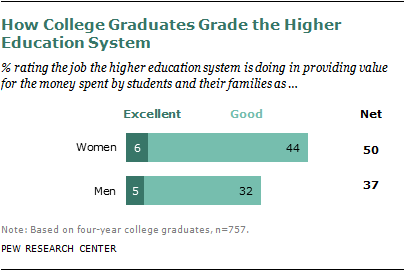Executive Summary

At a time when women surpass men by record numbers in college enrollment and completion, they also have a more positive view than men about the value higher education provides, according to a nationwide Pew Research Center survey. Half of all women who have graduated from a four-year college give the U.S. higher education system excellent or good marks for the value it provides given the money spent by students and their families; only 37% of male graduates agree. In addition, women who have graduated from college are more likely than men to say their education helped them to grow both personally and intellectually.
Also, while a majority of Americans believe that a college education is necessary in order to get ahead in life these days, the public is somewhat more inclined to see this credential as a necessity for a woman than for a man. Some 77% of respondents say this about women, while just 68% say it about men.1
This new survey of a nationally representative sample of 2,142 adults ages 18 and older was conducted at a time when women are outpacing men by significant numbers in college enrollment and completion. In 2010, a record 36% of women ages 25-29 had attained a bachelor’s degree. This compares with 28% of men in the same age group. Until roughly 1990, young men had outpaced young women in educational attainment. Women surpassed men in 1992, and since that time the gap has continued to widen.
There are also racial and ethnic patterns underlying these gender trends. Among young adults, whites are more likely than blacks or Hispanics to complete college. In 2010, 39% of whites ages 25-29 had at least a bachelor’s degree. That compares with 19% of blacks and 13% of Hispanics. Asian-Americans are more likely than any of these racial or ethnic groups to graduate from college—53% of those ages 25-29 had at least a bachelor’s degree in 2010.
Across all of these racial and ethnic groups, young women are more likely than young men to be college-educated. The gender difference in completion rates is reflected in the makeup of college graduates. Among all college graduates ages 25-29 in 2010, 55% were women and 45% were men. The gap was largest within the black community, where 63% of college-educated young adults were women and only 37% were men.
Data for this report come mainly from a Pew Research Center survey and Pew Research calculations of the educational data from the Current Population Surveys (CPS). The Pew Research survey was conducted by landline and cellular telephone March 15-29, 2011, among a nationally representative sample of 2,142 adults living in the continental United States.
Other Key Findings
- Women seem to see more benefit in their college education than do men. College-educated women are more likely than their male counterparts to say college was “very useful” in increasing their knowledge and helping them grow intellectually (81% vs. 67%), as well as helping them grow and mature as a person (73% vs. 64%).
- More women than men question the affordability of college. Only 14% of women who graduated from college agree that most people can afford to pay for college these days. This compares with 26% of male college graduates. Large majorities of both women and men say that college is no longer affordable for most people.
- Women who graduated from college are more likely than their male counterparts to report that their parents financed their education. Four-in-ten women say their parents paid for most of their college expenses, compared with 29% of men.
- Public reactions to the changing gender patterns in higher education are mixed. By a ratio of 52% to 7%, Americans say the fact that more women than men are graduating from college is a good thing, rather than a bad thing, for society. However, when presented with the flip side of the story, the public’s enthusiasm disappears. Some 46% of Americans say the fact that fewer men than women are graduating from college is a bad thing, while just 12% say it is a good thing.
About the Survey
This report is based on findings from a recent Pew Research Center survey as well as analyses of Current Population Survey (CPS) data on education trends.
The general public survey (GP) is based on telephone interviews conducted with a nationally representative sample of 2,142 adults ages 18 and older living in the continental United States, including an oversample of 336 adults ages 18-34. A total of 1,052 interviews were completed with respondents contacted by landline telephone and 1,090 with those contacted on their cellular phone. The data are weighted to produce a final sample that is representative of the general population of adults in the continental United States. Survey interviews were conducted under the direction of Princeton Survey Research Associates International in English and Spanish.
- Interviews conducted March 15-29, 2011
- 2,142 interviews
- 757 respondents with a four-year college degree or higher education
- Margin of sampling error is plus or minus 2.7 percentage points for results based on the total sample and 4.6 percentage points for college graduates at the 95% confidence level
Notes on Terminology
Unless otherwise noted, “college graduates” refers to those who graduated from a four-year college and hold a bachelor’s degree or higher.
Whites include only non-Hispanic whites. Blacks include only non-Hispanic blacks. Hispanics are of any race.
Acknowledgement
Paul Taylor, director of the Pew Research Center’s Social & Demographic Trends project, provided editorial guidance for this report. Richard Fry, senior researcher, provided the data on educational attainment based on the March Current Population Survey (CPS) Integrated Public Use Micro Sample. Eileen Patten did the number checking, and Marcia Kramer copy-edited the report.




